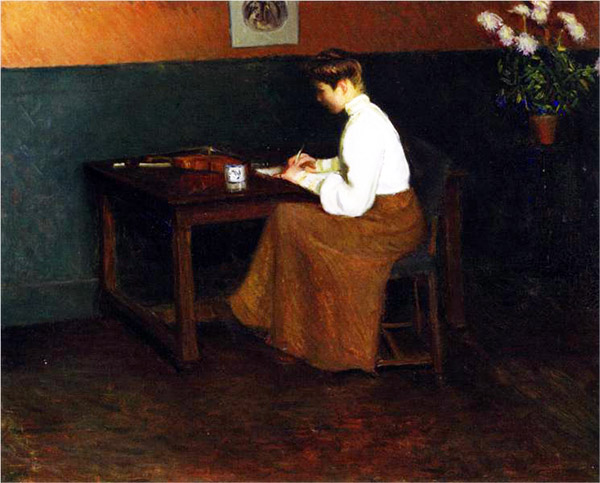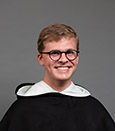Concerned with The Conduct of Life Itself: Caroline Gordon
- BR. FINBAR KANTOR
Caroline Gordon may be the most influential Catholic author you have never heard of.
 In the Studio by Lilla Cabot Perry, Public Domain, via WikiArt.
In the Studio by Lilla Cabot Perry, Public Domain, via WikiArt.
She was the wife of the poet Allen Tate, the literary mentor of Flannery O'Connor and Walker Percy, and helped found the creative writing department at the University of Dallas. In addition to writing her own fiction and criticism, Gordon worked with some of America's most notable authors and imparted to them the idea that fiction is "directly concerned with the conduct of life itself."
The problem of literature and the Catholic imagination is one of reality—salvation takes place in the cosmos that God created. Yet novelists often draw us into their own created world and away from God's. In contrast to this, Gordon's writing draws back the curtain of subjectivism that obstructs reality. She believed that the world has but one plot: the scheme of Redemption. "Any short story or novel," she wrote, "is a splinter, so to speak, of that plot—if it's any good" (Letters to a Monk). Her stories turn readers outwards, opening their eyes to the real world, to the work of God. "An artist's first duty is the same as any other man's—to serve, praise and worship God" ("Emmanuel! Emmanuel!").
Gordon's focus on reality began, as it often does, with the Greeks. She was born to a prominent Kentucky family and schooled in the classics at her father's Classical School for Boys in Clarksville, Tennessee. This education strongly influenced Gordon's early writing. She expressed that the classics offer the most thorough course in human nature, and her literary criticism frequently has recourse to Aristotle and Sophocles. As a professor, she taught aspiring novelists that they must understand the techniques of the masters before setting out on their own experiments.
After graduating from college, Gordon met the poet Allen Tate through their mutual friend, Robert Penn Warren, and Gordon soon followed Tate to New York, where they were married in 1925. Tate and Gordon traveled around Europe with their daughter, Nancy, and associated with American expatriate authors such as Hemmingway, Fitzgerald, and T.S. Eliot.
In 1947, Gordon entered the Catholic Church. This surprised some of her acquaintances, but Gordon saw her conversion as the logical culmination of a life lived "on the evidence of things not seen—what else is writing a novel but that?" (The Underground Stream: The Life and Art of Caroline Gordon). In testament to this continuity, it is difficult to point to a distinct difference between Gordon's pre- and post-conversion writing. Her style remains essentially unchanged—the only notable difference is the increased role faith plays in the stories following her conversion.
Much of Gordon's early work deals with family ties and southern identity following the Civil War. Her first published novel, Penhally (1931) is a fictional account of her ancestors in Kentucky from early America to after the Civil War. One of the recurring characters of her stories, Alec Maury—an idealized version of her father, often muses on his relation to his family and to nature, where he feels far more comfortable.
This theme of relationships remained important following her conversion, but was elevated by her faith. "It seems to me," Gordon wrote to a Benedictine monk, "the interworkings, intertwinings, of natural grace and supernatural grace (or the lack of it) are the only subjects for fiction." The Strange Children (1951) and The Malefactors (1956) similarly reflect on the importance of faith in the turmoil of modern family life. These two novels act as fictionalizations of Gordon's own life and her tumultuous relationship with Tate. The messiness of contingent realities is not limited only to the sphere of Gordon's literature: In 1945 Gordon and Tate divorced amid his infidelities, remarried within a year, and separated again in 1959.
Following what Jacques Maritain expressed in Art and Scholasticism, Gordon saw the primary concern of a novel to be "life as it manifests itself in change, in action" (How to Read a Novel). But the fiction author cannot record every action, every change, that occurs in his novel—he must have a guiding idea, an organizing principle. For Gordon, all worthwhile fiction—from Oedipus rex to The Tale of Jemima Puddle-Duck—is guided by the economy of conflict and resolution, the establishment of a point of view, and a central metaphor that links together symbols. These constants ground fiction in the goings-on of reality. She often begins her stories in medias res, revealing her characters' backgrounds and motivations through their words and actions, mirroring the natural movements of the mind as we come to know causes through their effects. Conversations overheard and interior observations move us to a deeper understanding of the characters and of human nature. Seemingly minute details are lingered over to allow us "ample time to take in what is happening, particularly if it's very important" (1951 Letter to Flannery O'Connor).
Gordon's life and literature are tied together by her twofold commitment to a realist philosophy and literary formalism. From Thomistic cosmology and epistemology, Gordon knew that we engage with reality through our senses. She crafted her fiction to be engaged with in the same way, following the "solidity of specification" and organic quality of action she admired in the formalism of Henry James. Details in scenery, dialogue, and narration create an image of reality that exists "as we exist in life, mysteriously, in more than one dimension." She passed this craft of fiction on to O'Connor, Percy, and the hundreds of students she taught, ensuring that the conduct of life would continue to be expressed.
The influence Caroline Gordon had on American literature is formidable. Though she has lain in obscurity the last few decades, her fiction and critical works remain full of insight and inspiration, like all things that express the truth. Cluny media has recently republished some of her works, giving Gordon some due notice. For all who are themselves concerned with the conduct of life, Caroline Gordon's novels, short stories, and criticism offer a clear reflection of reality.
 I hope you appreciated this piece. Before you move on, please consider taking the step of supporting CERC's mission with just $3.
I hope you appreciated this piece. Before you move on, please consider taking the step of supporting CERC's mission with just $3.
When you Google the answer to a question about faith and morals or current events in the Church, you often have to wade through dozens of misleading secular articles before finding a reliable source. CERC will give you faithful, reliable, well-reasoned answers to your questions—with just one click.
CERC is entirely reader supported. Around the world, readers can access CERC's free resources because of people like you. You give us the ability to provide the truth unfettered by algorithm censorship and secular-favored rankings.
Please consider supporting us just once with $3, or better yet, become a Guardian of Truth and support us every month with a little more. Thank you.
Meaghen Gonzalez
Editor

Acknowledgement
 Br. Finbar Kantor. "Concerned with The Conduct of Life Itself: Caroline Gordon." Dominicana (November 18, 2023).
Br. Finbar Kantor. "Concerned with The Conduct of Life Itself: Caroline Gordon." Dominicana (November 18, 2023).
Reprinted with permission from Dominicana.
The Author
Br. Finbar Kantor was raised in Scarsdale, NY as the second of seven children, attending Immaculate Heart of Mary Parish. He earned a Bachelor's degree in Music and Economics at The Catholic University of America in Washington, D.C. After graduation, Brother Finbar worked as a defense paralegal in Washington; it was then that he felt the call to serve the Church as a priest and to devote himself completely to God as a consecrated religious. "Attending Vespers and Mass at the Dominican House of Studies, I saw the fraternal zeal the brothers shared for their life. Seeing the charism of contemplative preaching for the salvation of souls lived out in the community confirmed in me the call to follow the path of Saint Dominic." He entered the Order of Preachers in 2020.
Copyright © 2023 Dominicana



